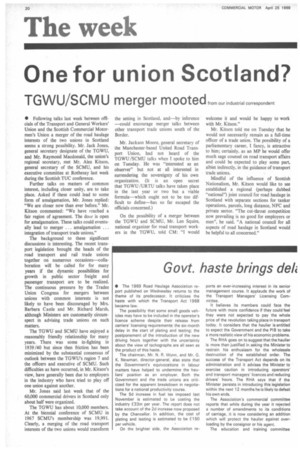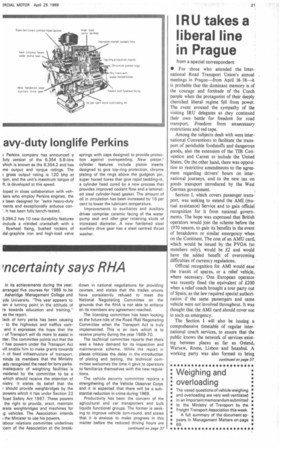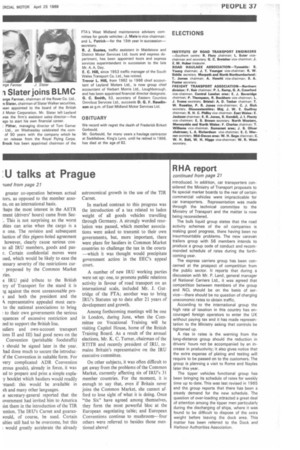Govt. haste brings deh
Page 22

Page 23

Page 39

If you've noticed an error in this article please click here to report it so we can fix it.
rn certain ty says RHA
• The 1969 Road Haulage Association report published on Wednesday returns to the theme of its predecessor. It criticizes the haste with which the Transport Act 1968 became law.
The possibility that some small goods vehicles may have to be included in the operator's licence scheme despite their release from carriers' licensing requirements.; the six-month delay in the start of plating and testing; the postponement of the introduction of the new driving hours together with the uncertainty about the view of tachographs are all seen as the product of this haste.
The chairman, Mr. N. R. Wynn, and Mr. G. K. Newman, director-general, also state that the Government's equivocations in labour matters have helped to undermine the hauliers' position as an employer. Both the Government and the trade unions are criticized for the apparent breakdown in negotiations for a national productivity course.
The 5d increase in fuel tax imposed last November is estimated to be costing the industry E33m per year. The report does not take account of the 2d increase now proposed by the Chancellor. In addition, the cost of plating and testing is estimated to be 150 per vehicle.
On the brighter side, the Association re
ports an ever-increasing interest in its senior management course. It applauds the work of the Transport Managers Licensing Committee.
It believes its members could face the future with more confidence if they could feel they were not expected to pay the whole price of the revolution taking place in transport today. It considers that the haulier is entitled to expect the Government and the PI B to take a more realistic view of his economic problems.
The RHA goes on to suggest that the haulier is more than justified in asking the Minister to restrain his enthusiasm for the wholesale destruction of the established order. The success of the Transport Act depends on its administration and it advises the Minister to exercise caution in introducing operators' and transport managers' licences and reducing drivers' hours. The RHA says that if the Minister persists in introducing this legislation within the next 12 months he is likely to defeat his own ends.
The Association's commercial committee reports that while during the year it rejected a number of amendments to its conditions of carriage, it is now considering an addition which will protect the haulier against overloading by the consignor or his agent.
The education and training committee in its achievements during the year. arranged five courses for 1969 to be Asheridge Management College and yde University. "This year appears to :en a turning point in the attitude of rs towards education and training," es the report,
lack of lorry parks has been causing to the highways and traffics cornand it expresses the hope that the r of Transport will do more to assist in tier. The committee points out that the r has powers under the Transport Act vill enable him to make grants towards ,t of fixed infrastructure of transport, -ninds its members that the Ministry ady recognized the need for lorry parks. inadequacy of weighting facilities is nsidered by the committee to be a which should receive the attention of nistry. It states its belief that the r should provide weighbridges by the powers which it has under Section 23 Road Safety Act 1967. These powers the right to provide, erect, maintain Crate weighbridges and machines for g vehicles. The Association intends ; the Minister to use his powers.
abour relations committee underlines 'cern of the Association at the break down in national negotiations for providing courses, and states that the trades unions have consistently refused to meet the National Negotiating Committee on the grounds that the RHA is not able to enforce on its members any agreement reached.
The licensing committee has been looking at the future role of the Road /Rail Negotiating Committee when the Transport Act is truly implemented. This is an item which is to receive priority during the year 1969-70.
The technical committee reports that there was a heavy demand for its inspection and maintenance scheme. While the report in places criticizes the delay in the introduction of plating and testing, the technical committee welcomes the time it gave to operators to familiarize themselves with the new regulations.
The vehicle security committee reports a strengthening of the Vehicle Observer Corps and it is expected that there will be a substantial reduction in crime during 1969.
Productivity has been the concern of the agricultural and car transporters and bulk liquids functional groups. The former is seeking to improve vehicle turn-round, and states that it is anxious to make progress in this matter before the reduced driving hours are
introduced. In addition, car transporters considered the Ministry of Transport proposals to fix special marker boards to the rear of certain commercial vehicles were impracticable for car transporters. Representation was made through the technical committee to the Ministry of Transport and the matter is now being reconsidered.
The bulk liquid group states that the road activity schemes of the oil companies is making good progress, there having been no insurmountable problems. The new caravan trailers group with 56 members intends to produce a group code of conduct and recommended schedule of rates during the forthcoming year.
The express carriers group has been concerned at the prospect of competition from the public sector. It reports that during a discussion with Mr. P. Land, general manager of National Carriers Ltd., it was agreed that competition between members of the group and NCL should be on the basis of service—there should be no question of charging uneconomic rates to obtain traffic.
According to the international group the high rate of taxation in this country has encouraged foreign operators to enter the UK without paying tax and it has made representation to the Ministry asking that controls be tightened up.
A rise in rates is the warning from the long-distance group should the reduction in drivers' hours not be accompanied by an increase in productivity; it also gives notice that the extra expense of plating and testing will require to be passed on to the customers. The group is planning a visit to Rome and Naples later this year.
The tipper vehicles functional group has been bringing its schedule of rates for weekly time up to date. This was last revised in 1965 and the group reports that there has been a steady demand for the new schedule. The question of over-loading attracted a great deal of attention among the tipper men particularly during the discharging of ships, where it was found to be difficult to dispose of the extra weight before leaving the dock area. This matter has been referred to the Dock and Harbour Authorities Association,
























































































































